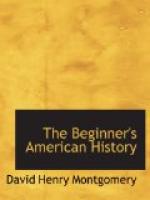247. The school in the woods; the new teacher; reading by the open fire; how “Abe” used the fire-shovel.—There was a log schoolhouse in the woods quite a distance off, and there “Abe” went for a short time. At the school he learned to read and write a little, but after a while he found a new teacher, that was—himself. When the rest of the family had gone to bed, he would sit up and read his favorite books by the light of the great blazing logs heaped up on the open fire. He had not more than half a dozen books in all. They were “Robinson Crusoe,” “Pilgrim’s Progress,” AEsop’s[4] Fables, the Bible, a Life of Washington, and a small History of the United States. The boy read these books over and over till he knew a great deal of them by heart and could repeat whole pages from them.
[Illustration: WRITING BY THE FIRE.]
Part of his evenings he spent in writing and ciphering. Thomas Lincoln was so poor that he could seldom afford to buy paper and pens for his son, so the boy had to get on without them. He used to take the back of the broad wooden fire-shovel to write on and a piece of charcoal for a pencil. When he had covered the shovel with words or with sums in arithmetic, he would shave it off clean and begin over again. If “Abe’s” father complained that the shovel was getting thin, the boy would go out into the woods, cut down a tree, and make a new one; for as long as the woods lasted, fire-shovels and furniture were cheap.
[Footnote 4: AEsop (E’sop): the name of a noted writer of fables. Here is one of AEsop’s fables: An old frog thought that he could blow himself up to be as big as an ox. So he drew in his breath and puffed himself out prodigiously. “Am I big enough now?” he asked his son. “No,” said his son; “you don’t begin to be as big as an ox yet.” Then he tried again, and swelled himself out still more. “How’s that?” he asked. “Oh, it’s no use trying,” said his son, “you can’t do it.” “But I will,” said the old frog. With that he drew in his breath with all his might and puffed himself up to such an enormous size that he suddenly burst.
Moral: Don’t try to be bigger than you can.]
248. What Lincoln could do at seventeen; what he was at nineteen; his strength.—By the time the lad was seventeen he could write a good hand, do hard examples in long division, and spell better than any one else in the county. Once in a while he wrote a little piece of his own about something which interested him; when the neighbors heard it read, they would say, “The world can’t beat it.”
At nineteen Abraham Lincoln had reached his full height. He stood nearly six feet four inches, barefooted. He was a kind of good-natured giant. No one in the neighborhood could strike an axe as deep into a tree as he could, and few, if any, were equal to him in strength. It takes a powerful man to put a barrel of flour into a wagon without help, and there is not one in a hundred who can lift a barrel of cider off the ground; but it is said that young Lincoln could stoop down, lift a barrel on to his knees, and drink from the bung-hole.




